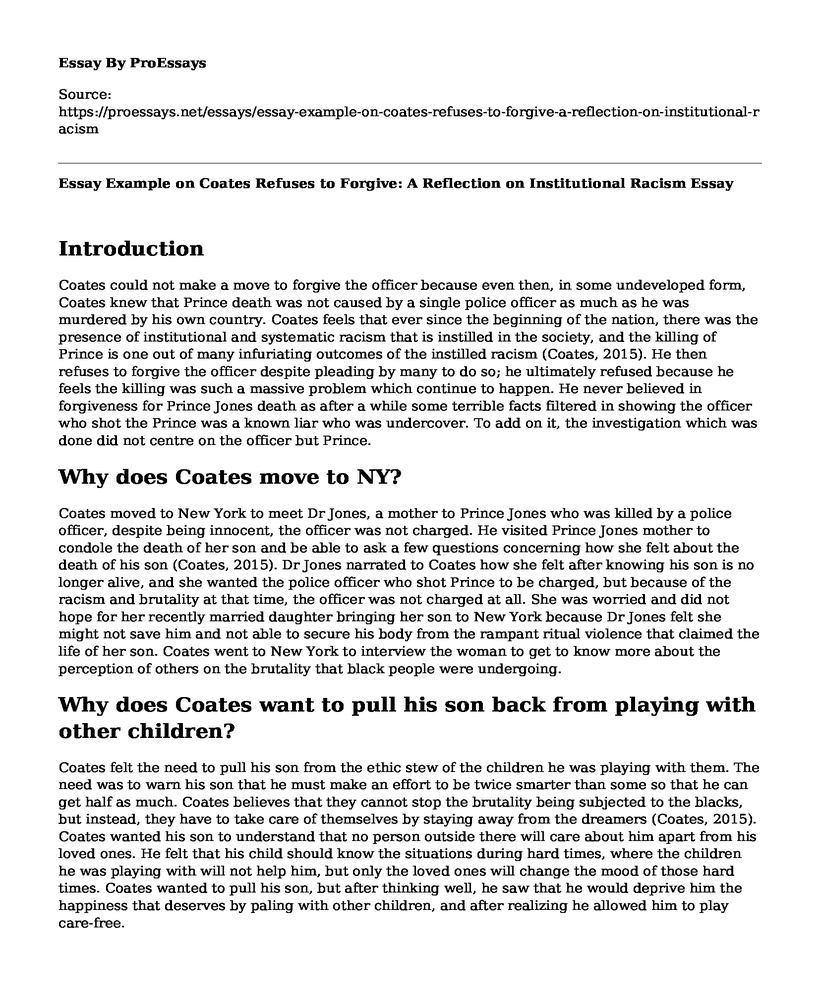Introduction
Coates could not make a move to forgive the officer because even then, in some undeveloped form, Coates knew that Prince death was not caused by a single police officer as much as he was murdered by his own country. Coates feels that ever since the beginning of the nation, there was the presence of institutional and systematic racism that is instilled in the society, and the killing of Prince is one out of many infuriating outcomes of the instilled racism (Coates, 2015). He then refuses to forgive the officer despite pleading by many to do so; he ultimately refused because he feels the killing was such a massive problem which continue to happen. He never believed in forgiveness for Prince Jones death as after a while some terrible facts filtered in showing the officer who shot the Prince was a known liar who was undercover. To add on it, the investigation which was done did not centre on the officer but Prince.
Why does Coates move to NY?
Coates moved to New York to meet Dr Jones, a mother to Prince Jones who was killed by a police officer, despite being innocent, the officer was not charged. He visited Prince Jones mother to condole the death of her son and be able to ask a few questions concerning how she felt about the death of his son (Coates, 2015). Dr Jones narrated to Coates how she felt after knowing his son is no longer alive, and she wanted the police officer who shot Prince to be charged, but because of the racism and brutality at that time, the officer was not charged at all. She was worried and did not hope for her recently married daughter bringing her son to New York because Dr Jones felt she might not save him and not able to secure his body from the rampant ritual violence that claimed the life of her son. Coates went to New York to interview the woman to get to know more about the perception of others on the brutality that black people were undergoing.
Why does Coates want to pull his son back from playing with other children?
Coates felt the need to pull his son from the ethic stew of the children he was playing with them. The need was to warn his son that he must make an effort to be twice smarter than some so that he can get half as much. Coates believes that they cannot stop the brutality being subjected to the blacks, but instead, they have to take care of themselves by staying away from the dreamers (Coates, 2015). Coates wanted his son to understand that no person outside there will care about him apart from his loved ones. He felt that his child should know the situations during hard times, where the children he was playing with will not help him, but only the loved ones will change the mood of those hard times. Coates wanted to pull his son, but after thinking well, he saw that he would deprive him the happiness that deserves by paling with other children, and after realizing he allowed him to play care-free.
How does Cates describe the lie of the Civil War?
According to Coates, the Civil War has been subjected to blurring, softening, and fudging of brutal truths. The goals and causes of the war have been shifted by the southerners by focusing on a narrative involving brother-versus-brother and downplaying the desire to protect both social and economic system based on destruction and pillage of black bodies. The battles like Gettysburg, which gained legendary status, was nothing; it was just fighting to preserve a chattel system of labor which is inhuman (Coates, 2015). The end of the war was also a lie; it laid the ground base for the Dream and means that the racial separation can be maintained by the country without the actual existence of slavery. Coates is obsessed with the history of Civil War as he felt uncomfortable during the battles in the south after going to the war sites as the other visitors who went to the sites cared about troop maneuvers more than what they are engineered to achieve. The bodies of the blacks were motive to the war, and they were robbed, beaten, pillaged, and raped by Pickett's men in pursuing their strange birthright. They lie at the end of the war was fought honorably by both sides as it brought the idea of Dream at the end.
What should Coates's son never do?
There are things that Coates never wished his son to do. He urged his son not to attempt under any circumstances to struggle for the dreamers; he told him not to pin his struggle for the dreamers as they are actively creating the deathbed for all of them (Coates, 2015). He told his son to just hope for the dreamers and not engage or pin his struggle on their conversation, but instead, take part in the struggle for the memory of his ancestors and wisdom. Through technology, the dreamers have pursued their interests, and they not only plunder with black bodies; instead, they are plundering with the bodies of the earth itself.
Reference
Coates, T. N. (2015). Between the world and me. Text publishing.
Cite this page
Essay Example on Coates Refuses to Forgive: A Reflection on Institutional Racism. (2023, Apr 24). Retrieved from https://proessays.net/essays/essay-example-on-coates-refuses-to-forgive-a-reflection-on-institutional-racism
If you are the original author of this essay and no longer wish to have it published on the ProEssays website, please click below to request its removal:
- Essay Example on Public Health: Obesity Among Teenagers
- Research Paper on Sexual Harassment
- Paper Example on Racism in the Classroom
- Child Abuse Research Paper
- Poverty in Education Essay Example
- Falsely Accused/Racial Controversy - Research Paper
- Research Paper on Homeless Individuals With Schizophrenia







